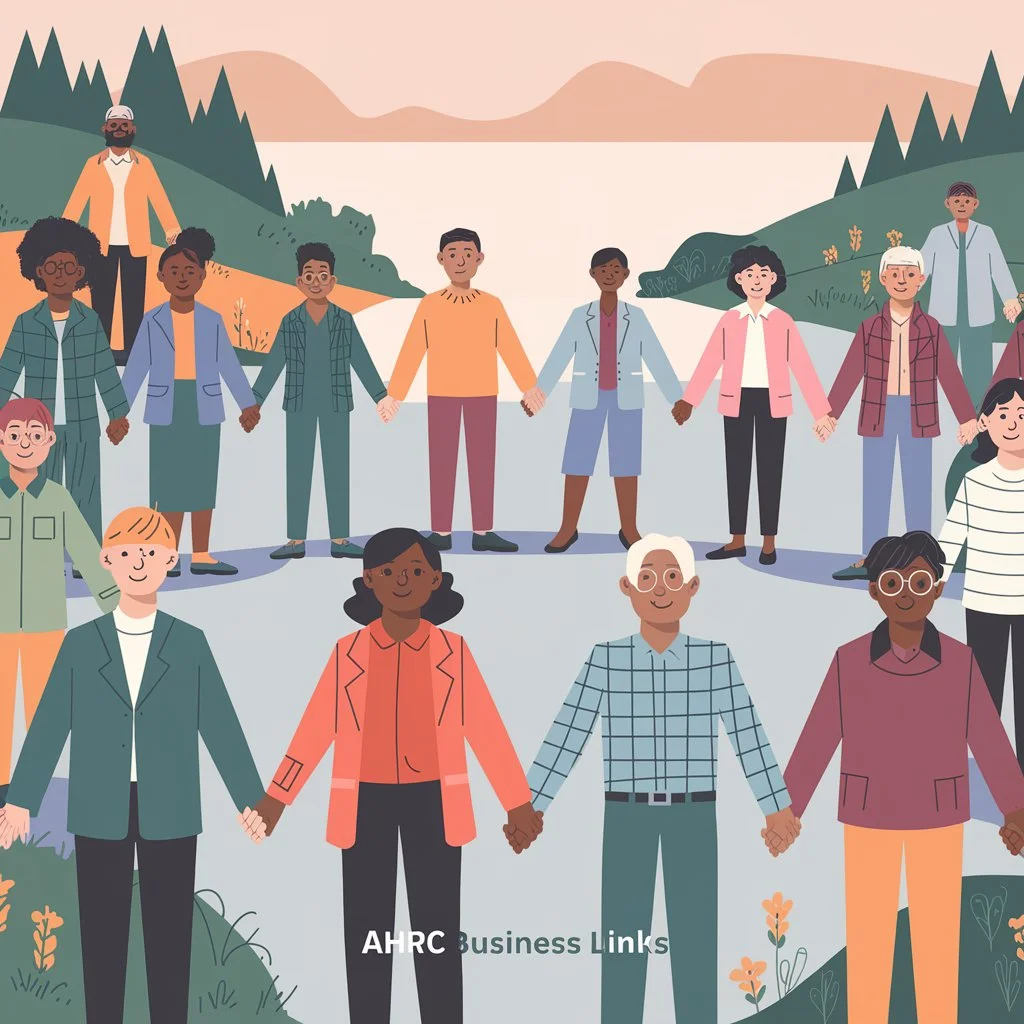The American Human Rights Council (AHRC) plays a vital role in advocating for human rights, social justice, and community empowerment. One of the pivotal ways in which AHRC achieves its mission is through the establishment of business links. These connections not only enhance the council’s capacity to serve marginalized communities but also create economic opportunities that foster development and resilience. This article delves into the significance of AHRC business links, the strategies employed to cultivate these connections, and the impact on communities and businesses alike.
If you want some information about Risks of Small Busniess Tarkov then checkout our last blog post.
Understanding AHRC’s Mission
The AHRC was founded with the objective of promoting and protecting human rights across various sectors, including education, employment, healthcare, and community development. The organization focuses on advocating for policies that support underrepresented populations and addressing systemic issues that contribute to inequality and injustice. By collaborating with businesses, AHRC aims to create synergies that benefit both the council’s mission and the economic landscape of the communities it serves.

If you want some information about Risks of Small Busniess Tarkov then checkout our last blog post.
The Role of Business Links
Business links refer to the connections and partnerships formed between AHRC and various businesses, ranging from small enterprises to large corporations. These links are critical for several reasons:
- Resource Mobilization: Businesses can provide financial support, services, or products that help AHRC in its initiatives.
- Economic Development: Partnerships can create job opportunities, internships, and training programs for community members, contributing to economic stability.
- Awareness and Advocacy: Collaborating with businesses helps raise awareness about human rights issues, encouraging corporate social responsibility and ethical practices.
- Community Engagement: Businesses that partner with AHRC often become more engaged with local communities, fostering a culture of inclusivity and support.
Strategies for Building Business Links
1. Networking Events
AHRC regularly organizes networking events that bring together business leaders, community members, and advocates. These events provide a platform for dialogue and collaboration. By facilitating conversations around shared values and mutual interests, AHRC helps businesses recognize the importance of supporting human rights initiatives.
Key Features:
- Workshops and Panels: These sessions focus on relevant topics, such as diversity and inclusion, corporate social responsibility, and community engagement.
- Matchmaking Opportunities: Businesses and community organizations are paired based on their interests and needs, fostering potential partnerships.
2. Sponsorship and Partnership Programs
AHRC actively seeks sponsorships from businesses to support specific programs or initiatives. These partnerships can take various forms, such as financial contributions, in-kind donations, or volunteer support from employees.
Benefits for Businesses:
- Brand Visibility: Sponsoring events or initiatives provides businesses with visibility in the community, enhancing their reputation.
- Community Relations: Businesses can strengthen their ties with local communities, showcasing their commitment to social responsibility.
3. Collaborative Projects
AHRC engages in collaborative projects with businesses that align with its mission. These projects can address specific community needs, such as education, job training, or health services.
Examples:
- Job Training Programs: Partnering with local businesses to provide skills training for unemployed or underemployed community members.
- Health Initiatives: Collaborating with healthcare companies to offer free or reduced-cost health services to underserved populations.
4. Corporate Social Responsibility (CSR) Initiatives
Encouraging businesses to adopt CSR practices is a key focus for AHRC. By promoting the idea that businesses can positively impact society while achieving their goals, AHRC helps create a culture of giving back.
Implementation:
- Consultation Services: AHRC offers consultation to businesses looking to develop or enhance their CSR strategies, aligning them with human rights goals.
- Recognition Programs: Acknowledging businesses that excel in their CSR efforts fosters healthy competition and inspires others to follow suit.
The Impact of AHRC Business Links
The business links fostered by AHRC have far-reaching impacts on both the communities served and the businesses involved. Below are some of the notable effects:
1. Empowerment of Marginalized Communities
By facilitating access to job training, internships, and employment opportunities, AHRC business links empower marginalized individuals. This empowerment leads to greater economic independence and enhances overall community well-being.
Case Study: Job Training Initiative
A partnership between AHRC and a local tech company created a job training program for young adults from underserved neighborhoods. Participants gained essential skills in coding and digital marketing, resulting in higher employment rates and increased self-esteem.
2. Promotion of Diversity and Inclusion
Business links promote diversity and inclusion within workplaces. Collaborations often encourage businesses to adopt more equitable hiring practices and create inclusive environments.
Example:
A partnership with a major retail chain led to the development of a diversity recruitment initiative, targeting underrepresented communities. As a result, the company reported a more diverse workforce and improved employee satisfaction.
3. Economic Development and Stability
The economic opportunities created through AHRC business links contribute to the overall stability of communities. Job creation, internships, and training programs lead to reduced unemployment rates and enhanced quality of life.
Economic Growth Metrics:
- Increased Job Placements: Partnerships with local businesses resulted in a 25% increase in job placements for program participants over a year.
- Support for Local Businesses: Collaborations often lead to increased patronage of local businesses, stimulating the local economy.
4. Enhanced Corporate Reputation
Businesses that engage with AHRC often experience enhanced reputations within the community. Their involvement in social causes demonstrates a commitment to ethical practices, which can attract customers and investors who prioritize social responsibility.
Research Insights:
Studies indicate that consumers are more likely to support companies that actively participate in community development and human rights advocacy. This trend underscores the importance of aligning business practices with social values.

If you want some information about Risks of Small Busniess Tarkov then checkout our last blog post.
Challenges in Establishing Business Links
Despite the numerous benefits, establishing and maintaining business links presents challenges. Understanding these obstacles is essential for both AHRC and businesses to navigate potential pitfalls.
1. Resource Constraints
Both AHRC and smaller businesses may face limitations in terms of time, finances, and manpower. These constraints can hinder the development of robust partnerships.
Solutions:
- Grant Opportunities: AHRC can seek grants that specifically fund partnership initiatives, alleviating some financial pressures.
- Volunteer Programs: Engaging volunteers from both AHRC and partnering businesses can help overcome manpower shortages.
2. Misalignment of Goals
Sometimes, businesses may have different priorities or objectives than AHRC, leading to misaligned partnerships. It’s crucial to ensure that both parties have a shared vision.
Solutions:
- Regular Communication: Establishing clear communication channels and regular check-ins can help align goals and expectations.
- Joint Planning Sessions: Involve both parties in planning processes to ensure that initiatives meet mutual objectives.
3. Sustainability of Partnerships
Maintaining long-term partnerships requires ongoing effort and commitment. The initial excitement of collaboration can wane over time, leading to decreased engagement.
Solutions:
- Evaluation Metrics: Establish key performance indicators to assess the impact of partnerships, ensuring that both parties remain engaged and motivated.
- Celebrating Success: Acknowledging and celebrating the successes of collaborations can reinforce the value of partnerships.
Future Directions for AHRC Business Links
As AHRC continues to develop its business links, several future directions can enhance the impact of these collaborations:
1. Leveraging Technology
Utilizing technology can streamline communication, enhance collaboration, and expand the reach of initiatives. Online platforms for training, networking, and information sharing can facilitate greater engagement between AHRC and businesses.
2. Expanding Outreach
AHRC can broaden its outreach to include more diverse sectors, such as tech, healthcare, and manufacturing. By engaging a wider array of industries, AHRC can tap into various resources and expertise.
3. Enhancing Training Programs
Developing specialized training programs that cater to the evolving job market will be essential. Collaborations with businesses can help identify skills gaps and create training initiatives that equip community members for in-demand roles.
4. Fostering Young Entrepreneurs
Encouraging entrepreneurship among young community members can drive economic growth. AHRC can create programs that support aspiring entrepreneurs through mentorship, funding opportunities, and business planning resources.
5. Advocacy for Policy Changes
AHRC can use its business links to advocate for policy changes that support economic development and social justice. By mobilizing businesses to engage in advocacy, AHRC can amplify its voice on critical issues.

If you want some information about Risks of Small Busniess Tarkov then checkout our last blog post.
Conclusion
The AHRC business links represent a powerful intersection of community development, economic opportunity, and human rights advocacy. By fostering relationships between businesses and marginalized communities, AHRC is paving the way for a more equitable society. The strategies employed to build these connections, while not without challenges, have resulted in meaningful impacts on individuals, families, and communities.
As we look to the future, the potential for growth and innovation within AHRC business links is immense. By leveraging technology, expanding outreach, enhancing training programs, and fostering entrepreneurship, AHRC can continue to empower communities and create lasting change. In doing so, it embodies the belief that businesses, when connected to human rights advocacy, can be catalysts for positive transformation.


